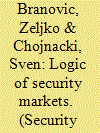| Srl | Item |
| 1 |
ID:
183478


|
|
|
|
|
| Summary/Abstract |
Dualistic spatial demarcations of a (peaceful) here and a (violent) there, near and far, global north and south are constant companions of social research. From the perspective of (political) science their task is to put in order the intricate social dynamics and entangled international spaces of peace and war. Casting complex and contested conflict realities into the frames of hegemonic patterns of interpretation (“north vs. south”, “strong state vs. failed state”) and visually shifting the causes of conflicts to the “spaces of violence” in the global south, cartographic representations are central to Eurocentric spatial fixations of conflict, peace and violence in political science and beyond. Against the reductionism of common spatial meta-narratives (state container, deterritorialization) our contribution argues for a reflexive use of Eurocentric spatial imaginations in general and maps in particular.
|
|
|
|
|
|
|
|
|
|
|
|
|
|
|
|
| 2 |
ID:
110778


|
|
|
|
|
| Publication |
2011.
|
| Summary/Abstract |
This article presents a theoretical framework with which to discuss how non-state modes of security governance evolve in the context of state failure and/or collapse. To address this issue, we present the logic of security markets, which assumes that the evolution of security governance by non-state groups in failed states is a function of both resource availability and the strategies that armed groups apply to extract resources from the civilian population. Axiomatically, we expect that in the short term the central purpose for the use of force is survival and achieving the ability to finance one's capabilities to use force, although ultimately this also includes the seizure and control of territory. The main argument is that the changing competitive conditions in security markets - which we measure in terms of the total number of violent groups and their organizational design, size and strength - explain the rationales behind the decisions of armed groups either to use violence against the civilian population or to invest in the provision of security.
|
|
|
|
|
|
|
|
|
|
|
|
|
|
|
|